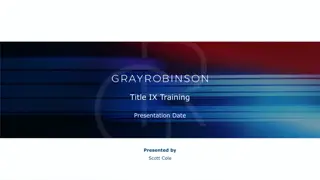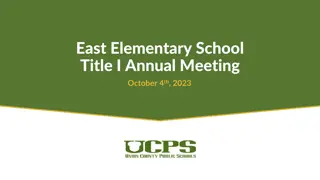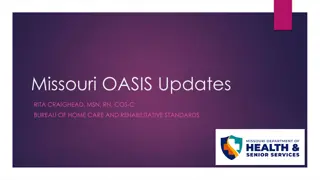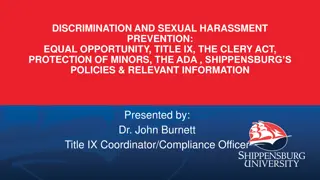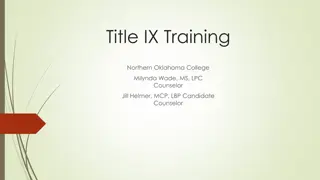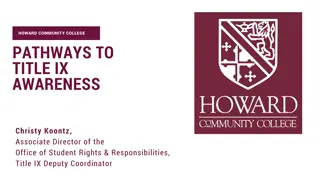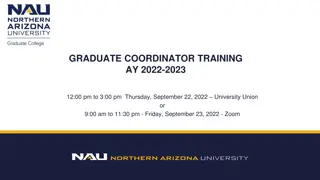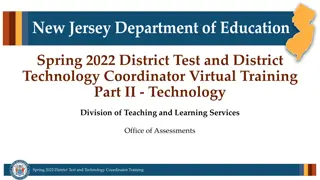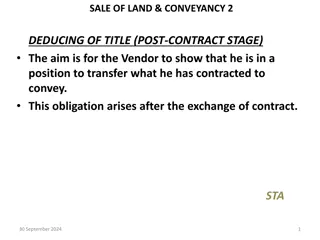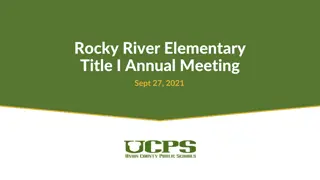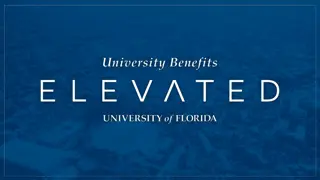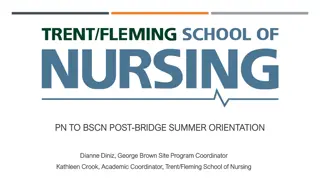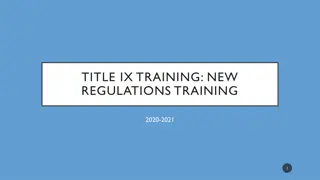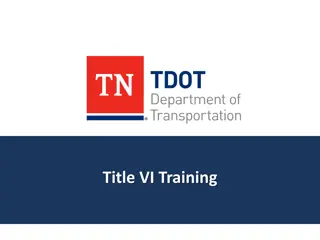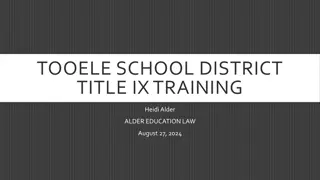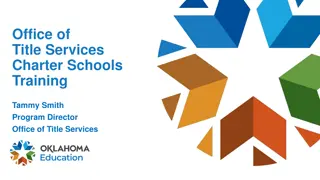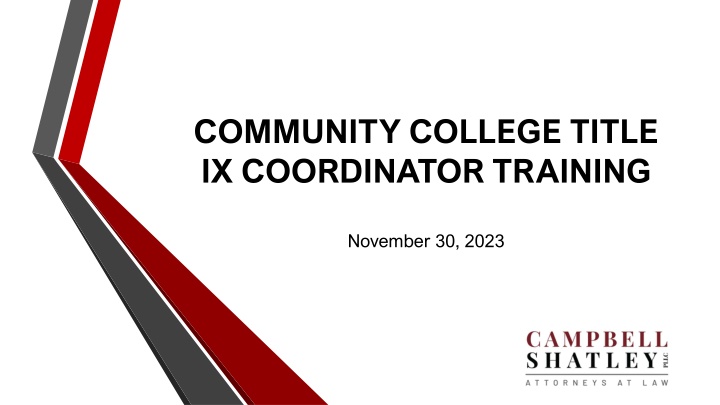
The Role of Title IX Coordinator in Community College
Explore the core responsibilities of a Title IX Coordinator in a community college, including overseeing the response to reports and complaints, addressing systemic issues, preventing bias and conflicts, and managing investigation processes.
Download Presentation

Please find below an Image/Link to download the presentation.
The content on the website is provided AS IS for your information and personal use only. It may not be sold, licensed, or shared on other websites without obtaining consent from the author. If you encounter any issues during the download, it is possible that the publisher has removed the file from their server.
You are allowed to download the files provided on this website for personal or commercial use, subject to the condition that they are used lawfully. All files are the property of their respective owners.
The content on the website is provided AS IS for your information and personal use only. It may not be sold, licensed, or shared on other websites without obtaining consent from the author.
E N D
Presentation Transcript
COMMUNITY COLLEGE TITLE IX COORDINATOR TRAINING November 30, 2023
TODAY'S WORK Roles and Responsibilities at the Outset of a Complaint Working through the Investigation and Decision- Making Process
TITLE IX COORDINATOR Title IX Coordinator A Title IX Coordinator's core responsibilities include overseeing the College's response to Title IX reports and complaints and identifying and addressing any patterns or systemic problems revealed by such reports and complaints. This means that the Title IX Coordinator must have knowledge of the requirements of Title IX, of the College's own policies and procedures on sex discrimination and of all complaints raising Title IX issues throughout the College.
TITLE IX COORDINATOR Coordinate the College's duty to PREVENT / INVESTIGATE / REMEDY ensure policy / grievance procedures are updated ensure notices are given to staff and students ensure formal complaints are investigated ensure appropriate steps to prevent immediate harm ensure investigators are appointed and trained ensure decision-makers are appointed and trained ensure that appeals officers are appointed and trained ensure proper record keeping ensure proper interaction with law enforcement
BIAS, CONFLICTS OF INTEREST, AND RECUSALS Bias can represent any variable that improperly influences a finding and/or sanction. There are many forms of bias and prejudice that can impact decisions and sanctions: Pre-determined outcome; Partisan approach by investigators in questioning, findings, or report; Partisan approach by decision-maker in questioning, findings, or sanction; Intervention by senior-level institutional officials; Improper application of institutional policies or procedures; Confirmation bias; Implicit bias; and/or Animus of any kind.
SESSION ONE One Initial Steps and Intake Two Assessing Jurisdiction Three Managing Dismissals Four Documentation and Recordkeeping
INITIAL COMPLIANCE STEPS Identify your Title IX team. Investigators, decision-makers, appeal entities, informal resolution facilitators, potential advisors. Define roles and identify the required separation between them. Consider your policy and procedure options. Informal Resolution; Formal Investigation; and Code of Conduct. How will you explain your process to others?
BEST PRACTICES FOR INTAKE Determine jurisdiction and scope. Offer AND document Supportive Measures. Provide written documentation to a potential complainant of their rights and resources.
BEST PRACTICES FOR INTAKE Explain options to a potential complainant. Option One: do nothing. Option Two: file a Formal Complaint and proceed with an Informal Resolution. Option Three: file a Formal Complaint and proceed with an Investigation including information that must be shared with a Respondent. Option Four: the complaint does not meet the definition of "sexual harassment" proceed under different policies.
INTAKE MEETINGS Did you as the Title IX Coordinator receive a "Formal Complaint" from a "Complainant"? Allegations against a Respondent? Alleges Sexual Harassment? Person is attempting to/participating in an education program or activity? The alleged Sexual Harassment occurred within the College's Title IX jurisdiction? Person experienced the alleged Sexual Harassment?
STRATEGIES FOR ADDRESSING A RELUCTANT COMPLAINANT Don't pressure them to make a decision today. Give them time to review their options. Encourage them to reach out to a counselor as a supportive measure. Schedule a check-in with them. Ensure they understand potential consequences of whatever decision they make.
TITLE IX COORDINATOR-SIGNED FORMAL COMPLAINTS When should the Title IX Coordinator file a Formal Complaint? When the Coordinator determines a "non-deliberately indifferent response to the allegations requires an investigation." Signing a Formal Complaint does NOT make the Coordinator a "complainant". Examples: Serial respondent; and Pattern of alleged sexual harassment by a respondent in a position of authority.
ASSESSING JURISDICTION
WHAT CONDUCT IS COVERED? Allegations of sexual harassment that occur in an education program or activity located within the United States and of which the recipient has actual knowledge. If a person alleges misconduct that fits in the above description, institutions have a duty to respond. The Title IX Final Rule sets out your legal obligations in responding to such allegations.
EDUCATION PROGRAM OR ACTIVITY REVIEW "includes locations, events, or circumstances over which the recipient exercised substantial control over both the respondent and the context in which the sexual harassment occurs, and also includes any building owned or controlled by a student organization that is officially recognized by a postsecondary institution." The easy ones: Classrooms; Cafeterias; and On-campus office hours.
EDUCATION PROGRAM OR ACTIVITY OFF CAMPUS? Any of the three conditions must apply to extend Title IX jurisdiction off campus: Incident occurs as part of the College's "operations"; If the College exercised substantial control over the respondent and the context of alleged sexual harassment; or Incident occurred in an off-campus building owned or controlled by a student organization officially recognized by the College.
EDUCATION PROGRAM OR ACTIVITY ONLINE STUDY "Operations" of the College may include computer and online programs and platforms "owned and operated by, or used in the operation of, the recipient." Still has to occur in educational program or activity And in the United States
ACTUAL KNOWLEDGE 1. Notice of sexual harassment or allegations of sexual harassment. 2. To one of the following: a. Title IX Coordinator, or b. Any official of the College who has authority to institute corrective measures on behalf of the College.
HOW TO AVOID BEING "DELIBERATELY INDIFFERENT" College officials with authority to correct sexual harassment shall respond promptly and impartially to actual knowledge of alleged sexual harassment in a manner that is not deliberately indifferent. "Deliberate Indifference" A college's response to the alleged harassment or the lack of any response is clearly unreasonable in light of the known circumstances AND such indifference either causes the person to undergo additional harassment, makes them vulnerable to further harassment, or otherwise contributes to the deprivation of access to an education program or activity.
HOW TO AVOID BEING "DELIBERATELY INDIFFERENT" Interactive Process: Reach out to Complainant. Offer Supportive Measures. Consider Complainant's wishes with respect to Supportive Measures. Supportive Measures can be given without filing a formal complaint. Explain Title IX Grievance Process. Implement Supportive Measures.
RESPONSE TO "ACTUAL KNOWLEDGE" Promptly contact Complainant to discuss availability of supportive measures. Consider Complainant's wishes with respect to supportive measures. Follow a grievance process that complies with federal regulations.
JURISDICTIONAL DETERMINATIONS Jurisdictional issues can arise at any time during the grievance process.
2023 REGULATIONS Removes requirement of written Complaint. Changes "sexual harassment" to "sex-based harassment", widening the circle of Title IX to all types of sex discrimination, including sexual harassment, athletics, employment, and pregnant/parenting accommodations. Changes "severe AND pervasive" to "severe OR pervasive" re: "unwelcome conduct". Requires institutions address a sex-based hostile environment in its education program or activity when sex-based harassment occurred outside the institution's education program or activity.
MANAGING DISMISSALS
CLOSING A REPORT OR COMPLAINT MANDATORY PERMISSIVE Allegations, even if proven, would not constitute a violation of Title IX Policy. Alleged sexual harassment did not occur in an education program or activity or in the U.S. Complainant requests withdrawal. Respondent is no longer enrolled or employed by the College. College is prevented from gathering sufficient evidence.
PROCEDURE TO CLOSE A REPORT OR COMPLAINT Title IX Coordinator must notify parties, including: The reason(s) for closure; Parties' rights to appeal; and Directions to an appropriate College office or department to resolve the report or complaint, if any.
DISMISSAL/EXIT RAMP SCENARIOS Each of the hypothetical facts below will build upon one another. Consider the following questions for each new fact: What do I do with this if it comes to the Title IX Office? Does the conduct at issue, if true, fall under Title IX's definition of sexual harassment? o If not, does it need to go somewhere else? Does the conduct at issue, if true, fall under Title IX's jurisdiction? o If not, does it need to go somewhere else?
DISMISSAL/EXIT RAMP SCENARIOS Joe and Sally are dating. Sally suspects Joe is cheating on her and calls the Title IX office to report him. Sally logs on to Joe's email account and finds an email from Becky that sets up a rendezvous in Joe's room. Sally grabs her best friend Angela to go confront Joe. Sally is mad and busts the lock on Joe's door to get into his room. Angela turns on her iPhone video to record the encounter. Joe and Becky are in bed having sex. Sally and Angela enter Joe's room, Sally screams at Joe and slaps him across the face. Sally pulls Becky out of bed, naked, and kicks her while she is on the floor. When Becky tries to leave the room, Sally grabs her breast and twists it, then threatens to kill her if she comes anywhere near Joe again. Becky leaves and runs out the door naked to her room down the hall.
DISMISSAL/EXIT RAMP SCENARIOS Joe shoves Sally and Angela out of his room so he can get dressed. Angela uploads the video to YouTube, then tweets the link and tags Joe and Becky. She titles the video "Little D*ck and the Skank". Within minutes, Joe and Becky have hundreds of comments directed towards them on social media. Some are negative and some are threatening. When Becky reads the messages, she begins to send texts to Sally: "I'm coming after you." "I see you across the Quad." "Don't go into that room alone or I'll get you." Becky sends approximately fifty similar messages over the course of the next two hours. Joe opens his closet to get dressed and lets his friend, Jim, out from where he was watching it all.
2023 REGULATIONS No mandatory dismissals. A Title IX Complaint may be dismissed if: College is unable to identify the Respondent; Respondent is not an employee or is not participating in a College education program or activity; Complainant voluntarily withdraws any part of the allegations and without the withdrawn allegations, the remaining conduct would not constitute sex-based harassment; or The alleged misconduct, even if proven, would not constitute sex- based harassment.
DOCUMENTATION AND RECORDKEEPING
TITLE IX TRAINING FOR TITLE IX PERSONNEL Annual training must be provided to Title IX Coordinators, investigators, decision-makers, and those involved in informal resolution. Training in the following topics is mandatory: The definition of sexual harassment for Title IX purposes. The scope of education programs and activities. How to conduct an investigation and grievance process, including hearings, appeals, and informal resolution. How to serve impartially. Technology to be used at hearings. Issues of relevance of questions and evidence at hearings. Issues of relevance in creating investigation reports.
COMPLIANCE REQUIREMENTS All training materials must be posted on Colleges' websites.
MAINTAINING RECORDS Reports and Formal complaints, including the basis for why the institutional response was not deliberately indifferent; Any actions taken in response to the report or formal complaint, including any supportive measures implemented; If supportive measures were not provided, reasons for why that was not clearly unreasonable in light of the known circumstances and Records must show measures taken are designed to restore or preserve equal access to education programs and activities.
MAINTAINING RECORDS Investigation records, such as investigator notes, documentary evidence collected, and the investigative report; Written determinations, sanctions, and remedies; Any recordings or transcripts from any live hearings; Appeals; Informal resolutions; and Training materials.
WHERE CAN STUDENTS / EMPLOYEES FIND THIS INFORMATION? College Policy College website and all student and employee handbooks: A statement of the College's policy of nondiscrimination on the basis of sex. Title IX Coordinator's contact information. A statement that Title IX inquiries may be referred to the Title IX Coordinator or to the Assistant Secretary for Civil Rights.
COLLEGE WEBSITE The College does not discriminate on the basis of sex in its education programs or activities and is required by Title IX of the Education Amendments Act of 1972 and federal regulations to not discriminate in such a manner. This requirement extends to admission and employment. Inquiries about the application of Title IX and its implementing federal regulations may be referred to the Title IX Coordinator and/or the Assistant Secretary for Civil Rights in the Office for Civil Rights at the U.S. Department of Education. The Title IX Coordinator's contact information is: ______________. All training materials.
SESSION TWO One Investigations What's Your Role? Two Informal Resolutions Three Making Supportive Measures Count Four Prevention, Program Assessment, and Partnerships
INVESTIGATIONS WHAT'S YOUR ROLE?
WHEN TO ACT When a College has "actual knowledge" of possible sexual harassment, it must undertake immediate and appropriate steps to offer supportive measures and determine if an investigation is required or requested. College will be deemed to have actual knowledge if the Title IX Coordinator or any College official with authority to institute corrective measures has notice of allegations of sexual harassment. College must not be "deliberately indifferent".
WHEN TO ACT Other sources of notice: Community: social media, print/television, community members. "Credible reports" of sexual harassment, particularly a pattern of acts against multiple students. "Widespread, openly practiced, or well-known" among students/employees.
WHEN TO INVESTIGATE Do the allegations as stated constitute a violation of College policy? (including whether the alleged conduct occurred in an education program or activity, located within the US, of which the College has actual knowledge) If yes, does Complainant want to pursue a formal investigation? o If yes, investigate. o If no, are the allegations of the type that the College must investigate regardless of Complainant's wishes?
WHEN TO INVESTIGATE Factors to consider if a Complainant does not want an investigation: The more serious the conduct, the higher need to investigate (e.g., one instance of rape). The more frequent the conduct, the higher the need to investigate (e.g., widespread behavior against multiple victims).
ACTING V. INVESTIGATING Immediate Steps: Communicate with individual who reported conduct; Implement supportive measures; Share College policy and procedure; and Determine whether allegations fall within Title IX Policy.
FORMAL COMPLAINTS May only be initiated/submitted by Complainant or Title IX Coordinator. Should include: Name and address of Complainant; Description of alleged sexual harassment; Request to investigate; and Signature of Complainant.
KEYS TO RESPONDENT CONTACT Both parties may be emotional and may need access to supportive measures and resources. Be sensitive and refrain from comments that blame either party, suggest disbelief/prejudgment, or discourage participation in the process. Document your interactions in writing after speaking with a party.
CONSOLIDATION OF FORMAL COMPLAINTS Provided the allegations arise out of the same facts or circumstances, colleges are permitted to consolidate formal complaints that are: Against more than one Respondent. By more than one Complainant against one or more Respondents. By one party against the other party.

